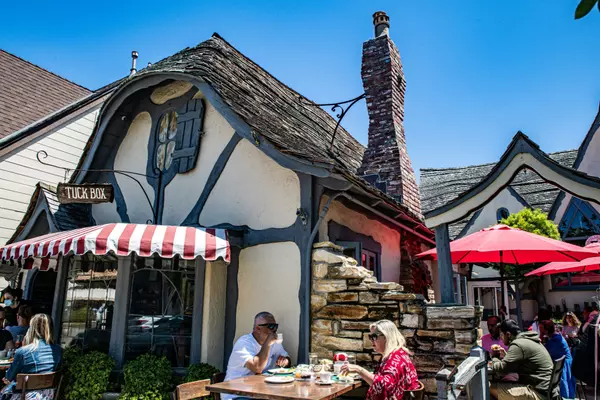Title vs. Escrow: What’s the Difference?

Title vs. Escrow: What’s the Difference — and Why It Matters When Buying a Home on the Monterey Peninsula
Picture this: your offer has been accepted on a home in Pacific Grove. You’ve celebrated, texted your friends, maybe even started browsing furniture. Then your agent calls and says, “Escrow is open with XYZ Title Company.” A few days later, someone from the company reaches out about preliminary reports and title insurance.
"Wait," you might be thinking, "are escrow and title actually the same thing?" The answer is that they often work side by side, but there are some crucial differences in their functions. Most people only learn these when they’re already knee-deep in paperwork. But understanding what each does (and how they protect you) can save you a lot of confusion (and possibly a lot of money) as you move through one of the biggest transactions of your life.
What Is Title?
When you buy a home, what you’re really buying is title, the legal right to own and use a property. The title shows who owns it, who’s owned it in the past, and whether there are any claims or “clouds” on it, like unpaid taxes, easements, or liens.
Before closing, a title company investigates the property’s history through a title search. They look for red flags: Does someone else have a legal interest in this home? Was there an unpaid contractor who recorded a lien years ago? Is there a shared driveway agreement that needs clarification?
Once they verify that everything checks out, the company issues title insurance, which protects you (and your lender) against future claims. Think of it as a one-time purchase of peace of mind. If, say, a long-lost heir or forgotten lien ever appears, the policy covers legal costs and losses.
Example:
You buy a home in Monterey for $1.1 million. Six months later, a contractor claims the previous owner never paid him $15,000 for roof work and files a lien. Without title insurance, that could become your problem. With title insurance, the title company steps in, handles the dispute, and you’re protected.
What Is Escrow?
If title is about ownership, escrow is about trust. It’s a neutral holding zone for all the funds, documents, and obligations involved in your real estate transaction.
In California, where transactions are particularly structured, the escrow process ensures that no money or property changes hands until every single condition in the purchase agreement is met.
Here’s how it works:
-
The buyer’s earnest money deposit goes into escrow.
-
The escrow officer coordinates signatures, loan funding, title clearance, and contingencies.
-
Once both sides have done everything required, the escrow officer records the new deed and releases the funds.
Think of escrow as a well-trained referee. It doesn’t take sides. It simply ensures that the deal follows the rules set out in your contract.
Example Timeline:
You open escrow on a home in Carmel for $2 million on May 1.
-
May 2–5: Title report ordered and delivered.
-
May 6–15: Inspections and contingencies.
-
May 16–25: Lender finalizes loan and clears to close.
-
May 27: Buyer wires funds to escrow.
-
May 28: Title records new deed with Monterey County Recorder.
-
May 29: Escrow closes, and keys are delivered.
That’s the clean version. In real life, escrow can stretch or contract depending on loan complexity, repairs, or appraisals. In California, most escrows last around 30 days.
How Title and Escrow Work Together
While title and escrow are separate functions, they often happen under one roof. Many companies on the Monterey Peninsula (like Chicago Title or Old Republic) handle both.
-
Title verifies that you’re buying a clean property.
-
Escrow makes sure the exchange of money and ownership happens properly.
It’s a checks-and-balances system: escrow won’t close until title is clear, and title won’t insure the home until escrow ensures all funds and documents are correct.
In essence, title protects ownership, and escrow protects the process.
Why California Is Different
California is one of the most regulated and detailed real estate markets in the country. Our purchase agreements are longer, our disclosures more extensive, and our escrow procedures more precise than in most states.
In some parts of the U.S., title companies act as attorneys. In others, closings happen around a single table, with everyone signing together. Not here. California’s system is independent and layered, designed to prevent misunderstandings and protect consumers.
Because we’re a “non-attorney closing state,” the escrow officer becomes the neutral third party responsible for following the contract to the letter.
Myth vs. Fact
Myth: “The escrow company works for the buyer or seller.”
Fact: Escrow is strictly neutral. It doesn’t represent either party. Its job is to enforce the contract and make sure all sides deliver on their promises.
Myth: “Title insurance is unnecessary if the seller seems trustworthy.”
Fact: Even honest sellers can have issues buried in a property’s history. Title insurance exists because no one can know every past transaction detail, especially in areas like Monterey or Carmel where homes have changed hands for generations.
Myth: “I can skip escrow if I pay cash.”
Fact: You could, but it’s risky. Escrow provides a structured framework to ensure both sides perform. Even in all-cash transactions, most California buyers wisely use escrow to handle the transfer securely.
What Buyers Should Know
If you’re buying a home anywhere from Seaside to Big Sur, your agent will guide you through both the title and escrow process . But understanding what’s happening behind the scenes helps you stay calm when things feel slow or overly procedural.
Expectations:
-
You’ll receive a Preliminary Title Report early on. Review it carefully with your agent. Look for easements, property boundaries, or “exceptions” that could affect use.
-
Escrow will send you a buyer’s package with forms to sign, including how you’ll take title (as individuals, joint tenants, a trust, etc.).
-
Just before closing, escrow will confirm your funds, loan documents, and title clearance.
-
Once all conditions are met, they’ll record the deed with the county, close the file, and hand over the keys.
Local Considerations
Every region on the Monterey Peninsula has its quirks.
In Pacific Grove and Monterey, title searches often reveal older easements or shared utilities dating back decades. These aren’t always deal-breakers, but they’re worth understanding.
In Pebble Beach, escrow can involve additional approvals from the Del Monte Forest Architectural Review Board, adding time to the process.
Carmel-by-the-Sea homes may lack formal addresses or have long-standing questions about property lines (another reason title work here is so essential).
Meanwhile, Carmel Valley or Highway 68 Corridor properties may include wells, septic systems, or acreage, which bring their own inspection and disclosure requirements.
Each of these realities makes Monterey County a fascinating (and sometimes complex) place to buy real estate. Title and escrow companies here know that, and their precision reflects decades of navigating local idiosyncrasies.
In Summary
When people say “we’re in escrow,” what they really mean is, “we’re in the home stretch.” Together, title and escrow form the backbone of every real estate transaction in California.
They ensure ownership is clear, money is secure, and promises are kept.
And when you’re buying on the Monterey Peninsula, where properties come with rich histories, unique boundaries, and a touch of old-California mystery, that peace of mind is worth its weight in gold.
Categories
Recent Posts










GET MORE INFORMATION

